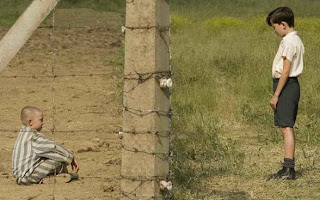Following my previous, mostly negative, review of "The Boy in the Striped Pyjamas" I thought it might be a good time to mention some works which (in my opinion anyway) manage to really capture some of the emotionally devastating consequences of the Holocaust from a variety of viewpoints. I did consider doing a top 5 list but in all honesty the books I've chosen are so different in style and approach that trying to put them into a meaningful order would be a pretty futile effort. And I do mean different. The difficulty of the subject matter has led to some interesting experimental techniques used to express the events of the Holocaust rather than the stark realism you might expect. So, without further ado, here are 5 books I think did it better than John Boyne's lacklustre attempt.
The Diary of a Young Girl- Anne Frank:
An obvious choice perhaps but there is a reason for that. This is an intense read which provides a direct window into the experiences of a Jewish girl trying to survive in Nazi occupied Amsterdam. Its strength lies in its immediacy and the knowledge that this is somebody who truly experienced it all. I could say more but since most, if not all, of you will be aware of this one all I'll add is that this is essential reading.
Maus- Art Spiegelman
A comic book (or Graphic Novel if you're a person who can't take the idea of a comic seriously) which used animals instead of people to depict the insanity of racial hatred. As you can imagine there are a lot of people with a problem with the choice of style since they claim cartoon animals are inherently amusing and therefore trivialise the subject but then that's kind of the point. It is a clever way of rendering the familiar unfamiliar, a staple in satire since its beginnings on a caveman's wall. The pointless insanity of racial hatred is deliberately held up as ridiculous but this doesn't mean the sombre and respectful tone applied in Maus is in any way diminished. An important work both for the medium and for the subject.
Sophie's Choice- William Styron
Survivor's guilt is the subject of this novel as a Polish woman struggles to live her life in America after having survived the concentration camps. She is trapped by an abusive relationship and her own alcoholism, neither of which manage to stave off the memories of the awful decision she was forced to make in her past. The story itself is actually told from the perspective of a young novelist, Stingo, who befriends Sophie and her unstable boyfriend Nathan and gradually learns more and more about Sophie's past through both her own stories and the scars she still carries. It is a very effective technique in showing how difficult it is to understand the realities of the Holocaust by staring directly at it, an opinion which is shared by the final two novels on this list.
Time's Arrow- Martin Amis
Yet another novel which was torn apart by certain critics claiming that it used gimmicky narrative techniques which undermined the serious nature of its subject matter. Here Amis has strayed a little from his usual stomping grounds of picking over the refuse and uncomfortable truths of modern society to attempt something even more ambitious. His obsession with the scabbed and pus-seeping under belly of human nature is intact but the narrative is told literally backwards with all the events occurring as though you are watching an old video recording played in reverse, eventually leading back into the central character's past experiences in the Holocaust. Again the intent is to make the familiar topic unfamiliar again so that we have to reconstruct the realities in our heads whilst reading, forcing a re-examination of certain facts which might be taken for granted since we've heard about them so many times. It's a difficult read and not for everybody but if you can get into it there is some seriously thought provoking stuff involved.
The White Hotel- D. M. Thomas
More experimentalism but this time taking a more psychoanalytical approach as one of Freud's patients provides multiple narratives, each in a different style and with much overlapping as erotic fantasy and brutal reality are woven into a single tragic story. It is a novel about the impossibility of dealing with reality and the need to flee into fantasy and indeed psychosis in order to maintain some semblance of the self. Very deep, very convoluted but very rewarding.














